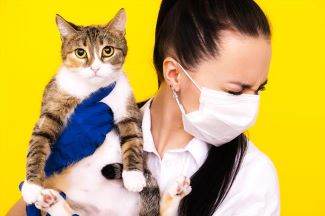Woman allergic to cats

Photo courtesy of Depositphotos
Life is full of cruel ironies: a black fly in your chardonnay, 10,000 spoons when all you need is a spork, etc.
But one of the cruelest I have ever encountered in my professional life is veterinarians who are allergic to animals. While not all veterinarians deal with companion animals (there are those who work in food safety or research, or, like me, mostly work online) a substantial number of veterinarians spend their days and nights treating dogs and cats and horses and birds and cows. So, developing sometimes debilitating allergies against the patients you work with can lead to a real impact on your ability to practice and make a living.
A recent non-scientific poll of almost 2400 veterinarians on the Veterinary Information Network (VIN), an online community for veterinarians and parent of VetzInsight, revealed that about 20% of veterinarians have allergies to cats or dogs that have affected their work to some degree. That's no small number! While most people reported only a small impact on their work, anyone who suffers from allergies knows that it's no fun. Imagine seeing your favorite patient, Delicious Sausage (an actual patient I know of!) and then spending the rest of the day at work with watery eyes and a bad case of the sneezies! No fun, and I know that some of your colleagues would be giving you the side-eye and wondering if you are spreading the ‘rona.
Why, Delicious Sausage…why?
I have a friend, Mary, who I have written about before for fostering squirrels. In addition to being quite insane - her word - she is also terribly, debilitatingly, allergic to dogs and cats. It got so bad that allergy shots and Mt. Fuji-like quantities of antihistamines could not keep the allergies at bay and she had to find other ways to make use of her degree. Before the allergies got bad, she loved having regular clients and patients, and even owned her own clinic. She now spends her days raising orphan baby squirrels, racoons, probably knitting life-size replicas of heads of state, and generally being wonderfully crazy.
As a kid I had terrible allergies to cats and horses, to the point that I once came home after riding horses with a friend at about age 7 with a face so swollen and mucous-y that my mother didn't recognize me. Luckily my allergies decided to give up before I got into vet school and I rarely experience anything but seasonal allergies to mold and pollen now. Allergies can be funny like that – you can grow into them, or you can grow out of them.
Some discussions on VIN about vets struggling with allergies point out the gritty reality of the situation.
I have mild allergies to some cats and to ferrets. I have severe allergies to horses. During my equine medicine rotation 4th year of school, I took Benadryl, pseudoephedrine, Zyrtec, and Flonase. I wore a professionally fitted respirator, goggles, cap, gloves, bunny suit, and shoe covers. I almost anaphylaxed by my 3rd day into the rotation with 3 horses in the barn. A vet almost gave me an epi shot. Needless to say, I do not work on equids.
I'm allergic to just about all animals.... dogs, cats, horses, cows, sheep, guinea pigs, rabbits, etc. (as well as pollens, dust, antibiotics, foods, and the list goes on...). I have both asthma that is exacerbated by being around pets with dander and skin reactions (breakouts, hives) to both dander and saliva. I manage pretty well with high doses of antihistamines (2 Claritin, 2 Zyrtec, 1 Benadryl in the morning and 3 Benadryl at night), inhaled steroids/albuterol, and the occasional course of [the steroid] Medrol.
I'm allergic to dogs, cats, feathers, ragweed, grass, trees, mold, etc....and I have chronic idiopathic urticaria [hives]. I function with cetirizine twice daily, famotidine once per day, fluticasone once to twice per day, but I still have hives. For three years. Six months ago, I started immunotherapy injections - so far, no change. I didn't notice any allergies at all until two months after vet school graduation. I'm not sure I would do this again. I love my job, but full body hives with angioedema [rapid swelling, large welts, and pain] for months at a time is not fun.
Ouch. I feel for those folks.
The good news is that there are many options for veterinarians to use their skills and training to help pets, even if they are allergic to them. A veterinary degree opens up many doors in science and is vital in protecting the public from diseases and illness. Veterinarians can work in labs, at pharmaceutical companies, as epidemiologists, researchers, pathologists, in food safety, government positions such as state veterinarians and U.S. Department of Agriculture, and policy types such as those at the American Veterinary Medical Association. It's just that most of those jobs don't involve getting to play with puppies and kittens as part of your job, or treating patients like Delicious Sausage.